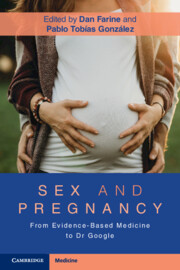Book contents
- Sex and Pregnancy
- Sex and Pregnancy
- Copyright page
- Dedication
- Contents
- Contributors
- Preface
- Section 1 General Issues
- Section 2 Specific Issues
- Chapter 9 Sex and Assisted Reproductive Technologies
- Chapter 10 The Male Partner’s Perspective
- Chapter 11 Sex in the First Trimester
- Chapter 12 Sex in the Second and Third Trimesters
- Chapter 13 Sex with Bleeding in the First Trimester
- Chapter 14 Sex with Bleeding in the Second and Third Trimesters
- Chapter 15 Short Cervix and Sex
- Chapter 16 Preterm Birth and Sex
- Chapter 17 Multiple Pregnancies and Sex
- Chapter 18 Special Pregnancies and Sex
- Chapter 19 Air Embolism Related to Sex in Pregnancy and the Postpartum
- Chapter 20 Pelvic and Ovarian Masses during Pregnancy
- Chapter 21 Sexually Transmitted Infections and Pregnancy
- Chapter 22 Sex for Induction of Labor
- Chapter 23 Nipple Stimulation during Pregnancy
- Chapter 24 Sex during the Postpartum
- Chapter 25 Sex after Pelvic Floor Injuries
- Chapter 26 Miscarriages, Spontaneous Abortions, Stillbirths, and Sex
- Index
- References
Chapter 19 - Air Embolism Related to Sex in Pregnancy and the Postpartum
from Section 2 - Specific Issues
Published online by Cambridge University Press: 09 November 2022
- Sex and Pregnancy
- Sex and Pregnancy
- Copyright page
- Dedication
- Contents
- Contributors
- Preface
- Section 1 General Issues
- Section 2 Specific Issues
- Chapter 9 Sex and Assisted Reproductive Technologies
- Chapter 10 The Male Partner’s Perspective
- Chapter 11 Sex in the First Trimester
- Chapter 12 Sex in the Second and Third Trimesters
- Chapter 13 Sex with Bleeding in the First Trimester
- Chapter 14 Sex with Bleeding in the Second and Third Trimesters
- Chapter 15 Short Cervix and Sex
- Chapter 16 Preterm Birth and Sex
- Chapter 17 Multiple Pregnancies and Sex
- Chapter 18 Special Pregnancies and Sex
- Chapter 19 Air Embolism Related to Sex in Pregnancy and the Postpartum
- Chapter 20 Pelvic and Ovarian Masses during Pregnancy
- Chapter 21 Sexually Transmitted Infections and Pregnancy
- Chapter 22 Sex for Induction of Labor
- Chapter 23 Nipple Stimulation during Pregnancy
- Chapter 24 Sex during the Postpartum
- Chapter 25 Sex after Pelvic Floor Injuries
- Chapter 26 Miscarriages, Spontaneous Abortions, Stillbirths, and Sex
- Index
- References
Summary
Air embolism is acute embolism resulting from vaginal insufflation. It was first reported in 1936. There is no definite report of its incidence, but has been described in 18 mortalities out of 20 million pregnancies. When air is introduced under pressure, it travels through the dilated cervical canal and beneath the amniotic membranes, to enter the subplacental sinuses. Once air enters the venous drainage of the uterus, it reaches the inferior vena cava, and from there to the right side of the heart. Patients with venous air embolism (VAE) may present with a wide variety of symptoms. The most serious manifestation of VAE is out-of-hospital cardiac arrest. Laboratory abnormalities vary according to the severity of the embolism but lack specificity. The first line of treatment is advising pregnant females against orogenital sex with air insufflation. Accurate diagnosis is the key for managing VAE. Management starts with administration of 100% oxygen, then turning the patient onto her left side in a head-down position. In case of cardiovascular collapse, closed-chest compression is used to remove air trapped in the right side of the heart. Hyperbaric oxygen therapy has been proved to be an effective therapy as well.
- Type
- Chapter
- Information
- Sex and PregnancyFrom Evidence-Based Medicine to Dr Google, pp. 138 - 143Publisher: Cambridge University PressPrint publication year: 2022

